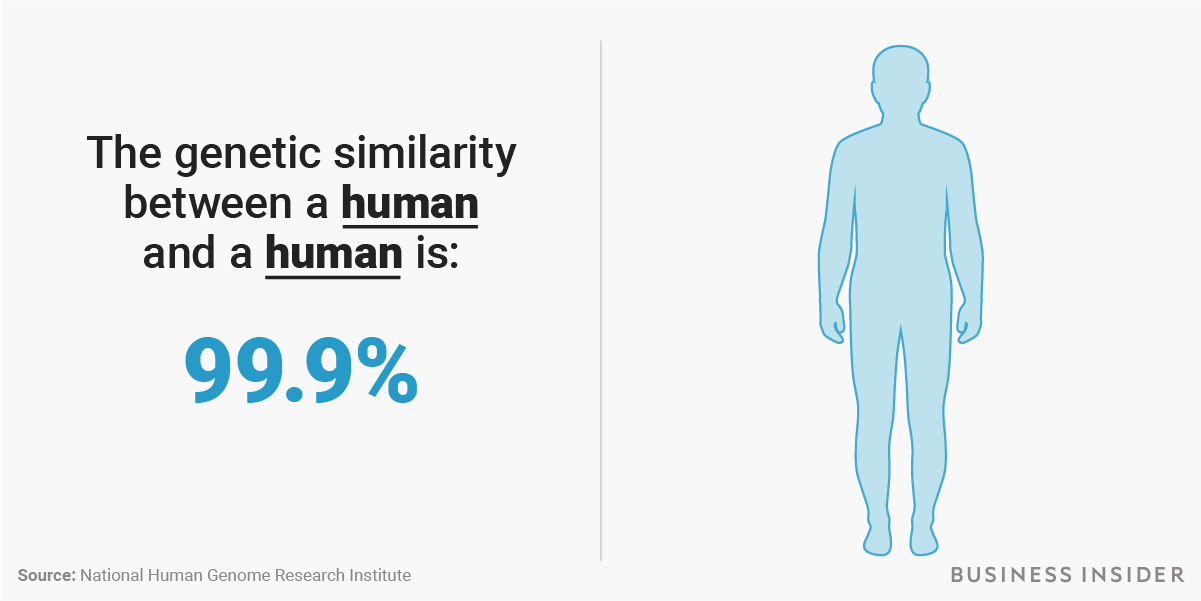Are all human beings 99.9 percent identical in their genetic makeup?

Are humans all 99.9% the same genetically
All human beings are 99.9 percent identical in their genetic makeup. Differences in the remaining 0.1 percent hold important clues about the causes of diseases.
Are humans 99% same in DNA
All living things share many functions (e.g., respiration) going back to a very distant past. Most of our DNA determines that we are human, rather than determining how we are different from any other person. So it is not so surprising that the DNA of any two human beings is 99.9 percent identical.
What are 99% of human genes identical to
Its findings suggested that all humans are 99.9% genetically identical and only 0.1% of genetic variations are responsible for the phenotypic differences, such as physical traits (eg, height, intelligence, hair, and eye color), disease susceptibility, and drug responses, among individuals in populations.
Do human beings share 99.9 percent of their DNA regardless of how they are classified
Race and human genetic variation
There is broad consensus across the biological and social sciences that race is a social construct, not an accurate representation of human genetic variation. Humans are remarkably genetically similar, sharing approximately 99.9% of their genetic code with one another.
Is 99.9 DNA identical
Humans are 99.9% identical on a genetic level. The 0.1% difference is caused by insertions, deletions and substitutions in the DNA sequence. These substitutions are known as Single Nucleotide Polymorphisms (SNPs). They occur about every 1000 base pairs.
Is it true that 99% of the DNA in all humans is different only 1% is exactly the same
The DNA of any two people on Earth is 99.6 percent identical. But 0.4 percent variation represents about 12 million base pairs, which can explain many of the differences between individuals, especially if the changes lie in key genes.
Is our DNA 100% human
Slivers of DNA may hold the most significant clues as to what truly distinguishes modern human beings from our earlier ancestors.
Are all humans genetically identical
Does everybody have the same genome The human genome is mostly the same in all people. But there are variations across the genome. This genetic variation accounts for about 0.001 percent of each person's DNA and contributes to differences in appearance and health.
Are all humans the same
As in all species, there is variation among individual human beings, from size and shape to skin tone and eye color. But we are much more alike than we are different. We are, in fact, remarkably similar.
Is approximately 99.5% of DNA the same across all individuals
The DNA of any two people on Earth is 99.6 percent identical. But 0.4 percent variation represents about 12 million base pairs, which can explain many of the differences between individuals, especially if the changes lie in key genes.
Is DNA 100% correct
Studies have shown that DNA evidence is 99% accurate, making it one of the most foolproof pieces of evidence you can possibly use in court. Like fingerprints, no two people have the same DNA. If a mistake occurs, it's typically because of human error. DNA evidence can greatly alter the outcome of a case.
What percent are all humans identical
99.6 percent identical
99.6. The DNA of any two people on Earth is 99.6 percent identical. But 0.4 percent variation represents about 12 million base pairs, which can explain many of the differences between individuals, especially if the changes lie in key genes. Our environment also contributes to our individuality.
Are all humans made the same
We are, in fact, remarkably similar. The DNA of all human beings living today is 99.9% alike. We all have roots extending back 300,000 years to the emergence of the first modern humans in Africa, and back more than 6 million years to the evolution of the earliest human species in Africa.
Are all humans equally evolved
According to Darwin, all current organisms are equally evolved and are all still affected by natural selection. So, a starfish and a person, for example, are both at the forefront of the evolution of their particular building plans.
How similar are all human beings
While the genetic difference between individual humans today is minuscule – about 0.1%, on average – study of the same aspects of the chimpanzee genome indicates a difference of about 1.2%.
Can two people have 100% same DNA
Identical (i.e., monozygotic, or MZ) twins share 100 percent of their genes, whereas fraternal (i.e., dizygotic, or DZ) twins generally share only 50 percent of their genes.
Is 99.9 of DNA identical
Humans are 99.9% identical on a genetic level. The 0.1% difference is caused by insertions, deletions and substitutions in the DNA sequence. These substitutions are known as Single Nucleotide Polymorphisms (SNPs). They occur about every 1000 base pairs.
Why does DNA test say 99.9 and not 100
High probabilities of 99% and above are commonly seen in DNA paternity testing, but never 100%. This is because results are based on statistical calculations. A result of 100% would only be possible if AlphaBiolabs tested every male of the same ethnicity as the biological father.
Are humans ____% identical genetically
In fact, despite our differences on the outside, humans are 99.9% genetically similar to one another.
Is DNA of all humans same
Does everybody have the same genome The human genome is mostly the same in all people. But there are variations across the genome. This genetic variation accounts for about 0.001 percent of each person's DNA and contributes to differences in appearance and health.
How much of the human genome is identical in all humans
99.6 percent identical
99.6. The DNA of any two people on Earth is 99.6 percent identical. But 0.4 percent variation represents about 12 million base pairs, which can explain many of the differences between individuals, especially if the changes lie in key genes. Our environment also contributes to our individuality.
Are all humans exactly the same
Our physical differences are actually really superficial in terms of genetics. We humans share 99.9% of our DNA with each other! And the 0.1% of DNA that is different between humans doesn't align neatly with race: the concept of race is not backed up by genetics.
What percent of humans DNA sequences are identical
The DNA of any two people on Earth is 99.6 percent identical. But 0.4 percent variation represents about 12 million base pairs, which can explain many of the differences between individuals, especially if the changes lie in key genes. Our environment also contributes to our individuality.
Do all humans have the same origin
“All humans share relatively recent common ancestry, but the story in the deeper past is more complicated than our species evolving in just a single location or in isolation,” says lead author Aaron Ragsdale, a population geneticist at the University of Wisconsin–Madison, to Reuters' Will Dunham.
Can DNA be 100% match
Using the strength of the genetic results in the Combined Paternity Index, a Probability of Paternity is calculated. We've already established that number can never be 100% unless every man in the world can also be tested.



0 Comments